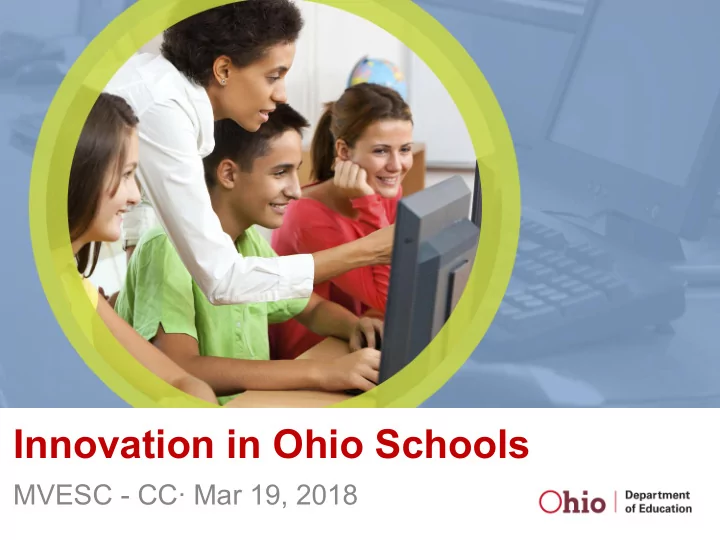

Innovation in Ohio Schools MVESC - CC∙ Mar 19, 2018
Office of Innovation Buddy Harris Director, Office of Innovation buddy.harris@education.ohio.gov Holly Lavender STEM Education Lead holly.lavender@education.ohio.gov http://bit.ly/2tY0Nd5
Today we shine. Tomorrow we shine. The next day we shine some more. The future is brighter because we illuminate it.
Why STEM?
Why STEM?
Why STEM?
F RAMEWORK FOR P ROFILE OF AN O HIO G RAD Foundational knowledge and skills Well-rounded content Technology skills Critical thinking and problem-solving skills Resiliency/grit/work ethic/growth mindset Communication—oral and written Engaged citizens Cultural awareness Teamwork/collaboration Adaptability/agility Social/emotional/interpersonal skills Curiosity/discovery Gathering information/discerning Innovative/creative
Other frameworks – Life Skills Competencies United Nations – World European Parliament – P21 Health Organization Strategy of Lisbon 1993 2006 Decision making Communication in the mother Creative thinking tongue Problem solving Communication in foreign Critical thinking languages Creative thinking Competence in math, Communication science, & technology Critical thinking Digital competence Collaboration Effective communication Learning to learn Interpersonal relationship Social and civic skills competencies Self-awareness Sense of initiative and entrepreneurship Empathy Cultural awareness and expression Coping with emotions Coping with stress
Building College and Career Readiness
Continuum – Assessment for Deeper Learning
Find and define problems/projects of interest to them Deal with loosely structured rather than overly-structured problems Deal with tasks that encourage them to see in new ways Take risks
The basis for design thinking.......
Step One: Define the Challenge Once given a challenge or a theme the students/designers answer the questions: Who? What? Where? When? Why? How? R. VandeZande
Step Two: Research R. VandeZande
Step Three: Brainstorm many possible solutions R. VandeZande
Step Four: Prototype R. VandeZande
Step Five: Presentation R. VandeZande
Step Six: Reflection Present your ideas to an audience, which may be peers, other teachers, administrators, community members, and/or professionals. Get feedback R. VandeZande
and Revision….......... ⦿ Based on the feedback received, decide if changes are needed to improve your solution. R. VandeZande
Teamwork R. VandeZande
R. VandeZande
Complex PBL Project •Design a portable home for a homeless teen –Portable and able to withstand weather elements –Must have an electrical component that could support a light source –Sleeping compartment big enough to accommodate one teenager –Must consider impact on health of the teen
Complex PBL Project •Partner with local organizations •Interview stakeholders Research, interviews, initial design, initial presentation of design, modifications, prototype(s) and testing, evaluation against criteria, additional modifications, final design and marketing, presentation to stakeholders •Portfolio Relevant, authentic problem, local context Authentic audience, STUDENT DRIVEN
Complex PBL Project •Criteria for evaluation: –Demonstration of content knowledge and application –Process –Addressing the problem –Creativity (innovative approaches) –Clarity of expression/presentation Relevant, authentic problem, local context Authentic audience, STUDENT DRIVEN
Alignment
Alignment ™
Alignment
Alignment
Alignment
education.ohio.gov holly.lavender@education.ohio.gov buddy.harris@education.ohio.gov
Join the Conversation OHEducation OHEducation @OHEducation @OHEducationSupt OhioEdDept
Recommend
More recommend